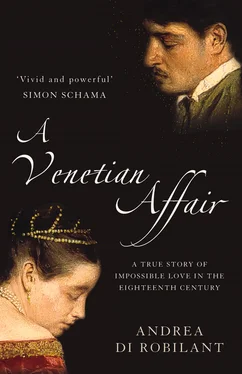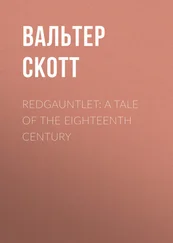Smith organized a grand funeral ceremony, which was attended by a large contingent of Venice’s foreign community (the Italians were absent because the Catholic Church forbade the public mourning of Protestants). A Lutheran merchant from Germany, a friend of the consul, recorded the occasion in his diary: “Signor Smith received condolences and offered everyone sweets, coffee, chocolate, Cypriot wine and many other things; to each one he gave a pair of white calfskin gloves in the English manner.” Twenty-five gondolas, each with four torches, formed the procession of mourners. The floating cortege went down the Grand Canal, past the Dogana di Mare, across Saint Mark’s Basin, and out to the Lido, where Catherine’s body was laid to rest in the Protestant cemetery: “The English ships moored at Saint Mark’s saluted the procession with a storm of cannon shots.” 1
The consul was eighty years old but still remarkably fit and energetic. He had no desire to slow down. By early spring gossips were whispering that his period of mourning was already over and he was eager to find a new wife—a turn of events that caused quite a commotion in the English community.
John Murray, the British Resident, had had a prickly relationship with Smith ever since he had arrived in Venice in 1751. Smith had vied for the position himself, hoping to crown his career by becoming the king’s ambassador in the city where he had spent the better part of his life. But his London connections had not been strong enough to secure it, and Murray, a bon vivant with a keener interest in women and a good table than in the art of diplomacy, had been chosen instead. “He is a scandalous fellow in every sense of the word,” complained Lady Mary Wortley Montagu, who, rather snobbishly, preferred the company of local patricians to that of her less aristocratic compatriots. “He is not to be trusted to change a sequin, despised by this government for his smuggling, which was his original profession, and always surrounded with pimps and brokers, who are his privy councillors.” 2 Casanova, predictably, had a different view of Murray: “A handsome man, full of wit, learned, and a prodigious lover of the fair sex, Bacchus and good eating. I was never unwelcome at his amorous encounters, at which, to tell the truth, he acquitted himself well.” 3
Smith did not hide his disappointment. In fact he went out of his way to make Murray feel unwelcome, and the new Resident was soon fussing about the consul with Lord Holderness, the secretary of state, himself an old Venice hand and a friend to the Wynnes: “As soon as I got here I tried to follow your advice to be nice to Consul Smith. But he has played so many unpleasant tricks on me that I finally had to confront him openly. He promised me to be nice in the future—then he started again, forcing me to break all relations.” 4
Catherine’s death and, more important, Smith’s intention to marry again brought a sudden thaw in the relations between the Resident and the consul. Murray conceived the notion that his former enemy would be the perfect husband for his aging sister Elizabeth, whom he had brought over from London (perhaps Murray also calculated that their marriage would eventually bring the consul’s prized art collection into his hands). Smith was actually quite fond of Betty Murray. He enjoyed her frequent visits at Palazzo Balbi. She was kind to him, and on closer inspection he found she was not unattractive. Quite soon he began to think seriously about marrying “that beauteous virgin of forty,” as Lady Montagu called her. 5
Murray and his sister were not alone in seeing the consul in a new light after Catherine’s death. Mrs. Anna too had her eye on him, because she felt he would be the perfect husband for Giustiniana: Smith could provide her daughter a respectable position in society as well as financial security. Furthermore, he had been a friend of the family for twenty years, and he would surely watch over the rest of the young Wynnes—at least for the short time that was left to him. After all, wasn’t such a solution the best possible way to fulfill the promise he had made to look after Sir Richard’s family? Mrs. Anna began to lure the consul very delicately, asking him over to their house more frequently, showing Giustiniana off, and dropping a hint here and there. She set out to quash the competition from Betty Murray while attempting to preserve the best possible relations with her and her brother. Inevitably, though, tensions in their little group rose, and Betty Murray reciprocated by drawing the consul’s attention to the fact that, as far as she could tell, Giustiniana still seemed very much taken with Andrea.
At first Giustiniana was stunned by her mother’s plan, but she knew that the matter was out of her hands. And although she was only eighteen, she did not express disgust at the idea of marrying an octogenarian. She was fond of Smith, and she also recognized the material advantages of such a marriage. But all she really cared about was how the scheme would affect her relationship with Andrea. Would it protect their love affair, or would it spell the end? Would it be easier for them to see each other or more difficult? The consul was so old that the marriage was bound to be short-lived. What would happen after he died?
Andrea had often said, sometimes laughing and sometimes not, that their life would be so much happier if only Giustiniana were married or, even better, widowed. It had been fanciful talk. Now, quite unexpectedly, they contemplated the very real possibility that Giustiniana might be married soon and widowed not long after. Andrea became quite serious. He set out his argument with care:
I want you to understand that I want such a marriage for love of you. As long as he lives, you will be in the happiest situation…. You will not have sisters-in-law and brothers-in-law and God knows who else with whom to argue. You will have only one man to deal with. He is not easy, but if you approach him the right way from the beginning, he will eagerly become your slave. He will love you and have the highest possible regard for you…. He is full of riches and luxuries. He likes to show off his fortune and his taste. He is vain, so vain, that he will want you to entertain many ladies. This will also open up the possibility for you to see gentlemen and be seen in their company. We will have to behave with great care so that he does not discover our feelings for each other ahead of time .
Andrea began to support Mrs. Anna’s effort by dropping his own hints to Smith about what a sensible match it would be. Giustiniana stepped into line, though warily, for she continued to harbor misgivings. As for the consul, the mere prospect of marrying the lovely girl he had seen blossom in his drawing room put him into a state of excitement he was not always able to contain. Andrea immediately noticed the change in him. “[The other evening] he said to me, ‘Last night I couldn’t sleep. I usually fall asleep as soon as I go to bed. I guess I was all worked up. I couldn’t close my eyes until seven, and at nine I got up, went to Mogliano, * ate three slices of bread and some good butter, and now I feel very well.’ And to show me how good he felt he made a couple of jumps that revealed how energetic he really is.”
Word about a possible wedding between the old consul and Giustiniana began to circulate outside the English community and became the subject of gossip in the highest Venetian circles. Smith did little to silence the talk. “He is constantly flattering my mother,” Giustiniana wrote to Andrea. “And he lets rumors about our wedding run rampant.” Andrea told Giustiniana he had just returned from Smith’s, where a most allusive exchange had taken place in front of General Graeme, † the feisty new commander in chief of Venice’s run-down army, and several other guests:
Читать дальше












